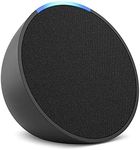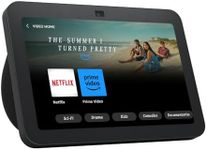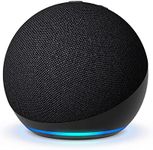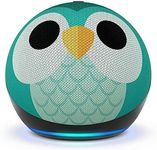Buying Guide for the Best Smart Speakers
Smart speakers are a fantastic addition to any home, offering convenience, entertainment, and connectivity. They can play music, control smart home devices, answer questions, and much more, all through voice commands. When choosing a smart speaker, it's important to consider how you plan to use it, the ecosystem it supports, and the features that matter most to you. Understanding the key specifications will help you make an informed decision that best fits your lifestyle and needs.Voice Assistant CompatibilityVoice assistant compatibility refers to the virtual assistant that the smart speaker uses, such as Amazon Alexa, Google Assistant, or Apple Siri. This is important because it determines how you interact with the speaker and which ecosystem of devices and services it can control. If you're already using a particular ecosystem, it makes sense to choose a speaker that supports the same voice assistant. For example, if you have other Google devices, a speaker with Google Assistant might be the best fit.
Sound QualitySound quality is a measure of how well the speaker can reproduce audio, including music, podcasts, and voice responses. This is important if you plan to use the speaker for listening to music or other audio content. Sound quality can vary greatly between models, with some offering rich, full sound and others being more basic. If you're an audiophile or plan to use the speaker primarily for music, look for models with high-quality audio components and features like bass enhancement.
Connectivity OptionsConnectivity options refer to the ways the smart speaker can connect to other devices and networks, such as Wi-Fi, Bluetooth, or auxiliary inputs. This is important for streaming music, connecting to other smart home devices, or using the speaker as part of a multi-room audio setup. If you want to stream music from your phone, Bluetooth connectivity might be essential. For integration with other smart home devices, ensure the speaker supports the necessary protocols, like Zigbee or Z-Wave.
Smart Home IntegrationSmart home integration is the ability of the smart speaker to connect and control other smart home devices, such as lights, thermostats, and security systems. This is important if you want to use the speaker as a hub for your smart home. Consider the devices you already own or plan to purchase, and ensure the speaker is compatible with them. Some speakers have built-in hubs for certain smart home protocols, which can simplify setup and control.
Design and SizeDesign and size refer to the physical appearance and dimensions of the smart speaker. This is important if you have specific aesthetic preferences or space constraints. Smart speakers come in various shapes, sizes, and colors, so you can choose one that fits your decor and available space. If you plan to move the speaker around, consider a more compact and portable design. For a permanent spot, you might prioritize a design that complements your room's style.
Privacy FeaturesPrivacy features are the measures a smart speaker takes to protect your personal information and ensure your conversations remain private. This is important if you're concerned about data security and privacy. Look for features like a physical mute button to disable the microphone, or the ability to review and delete voice recordings. Understanding the manufacturer's privacy policy and how they handle data can also help you make a more informed choice.










